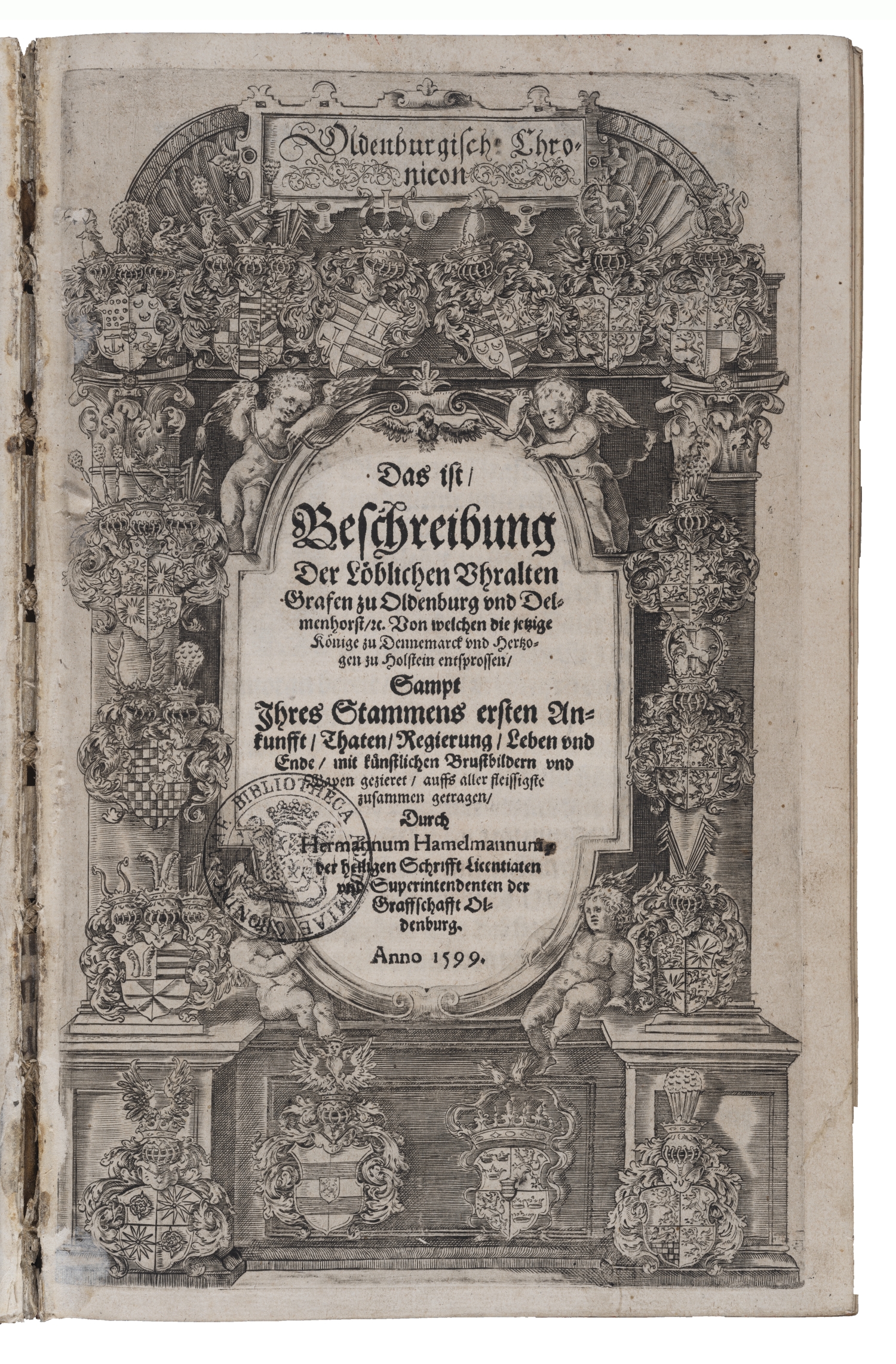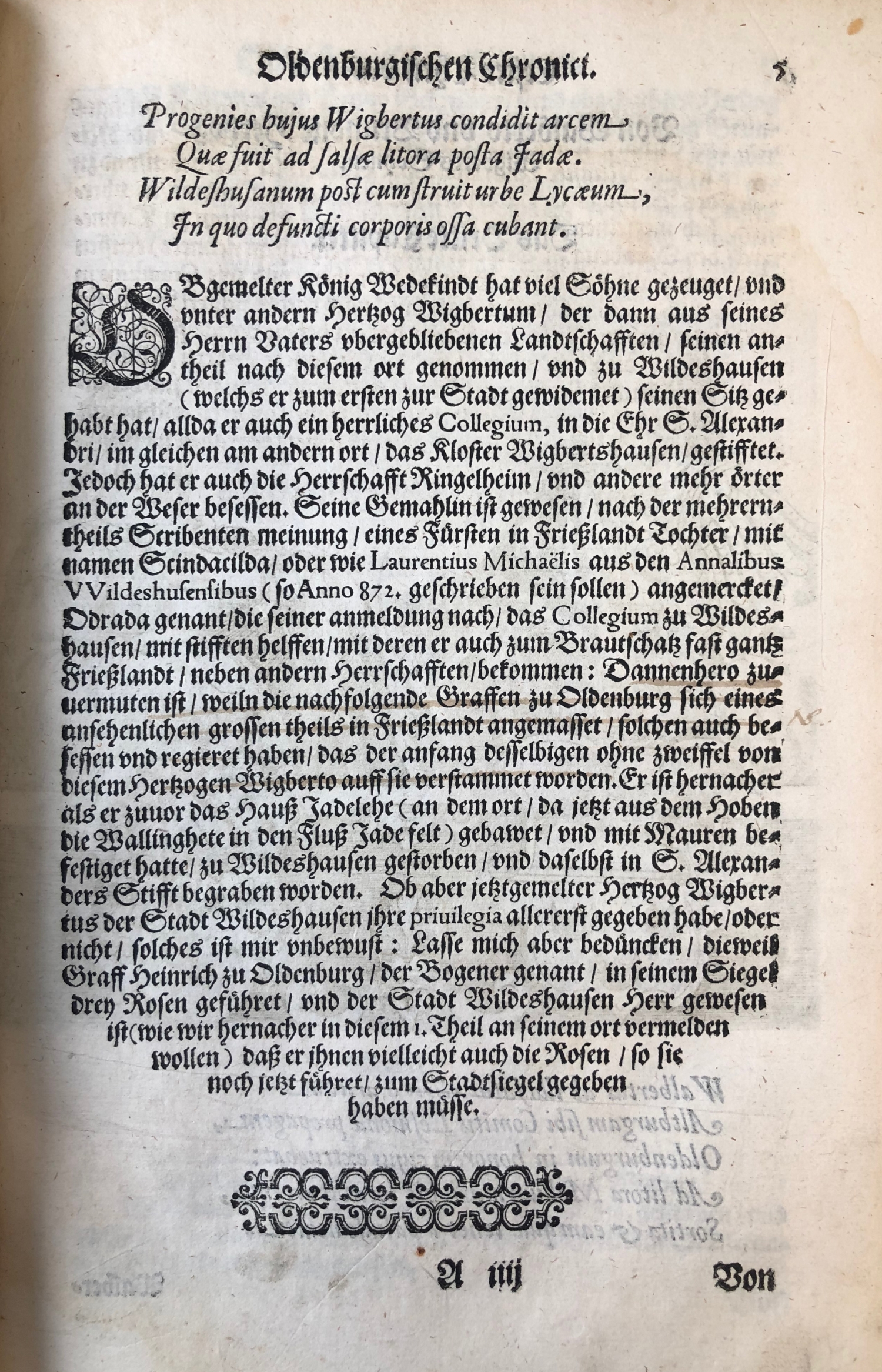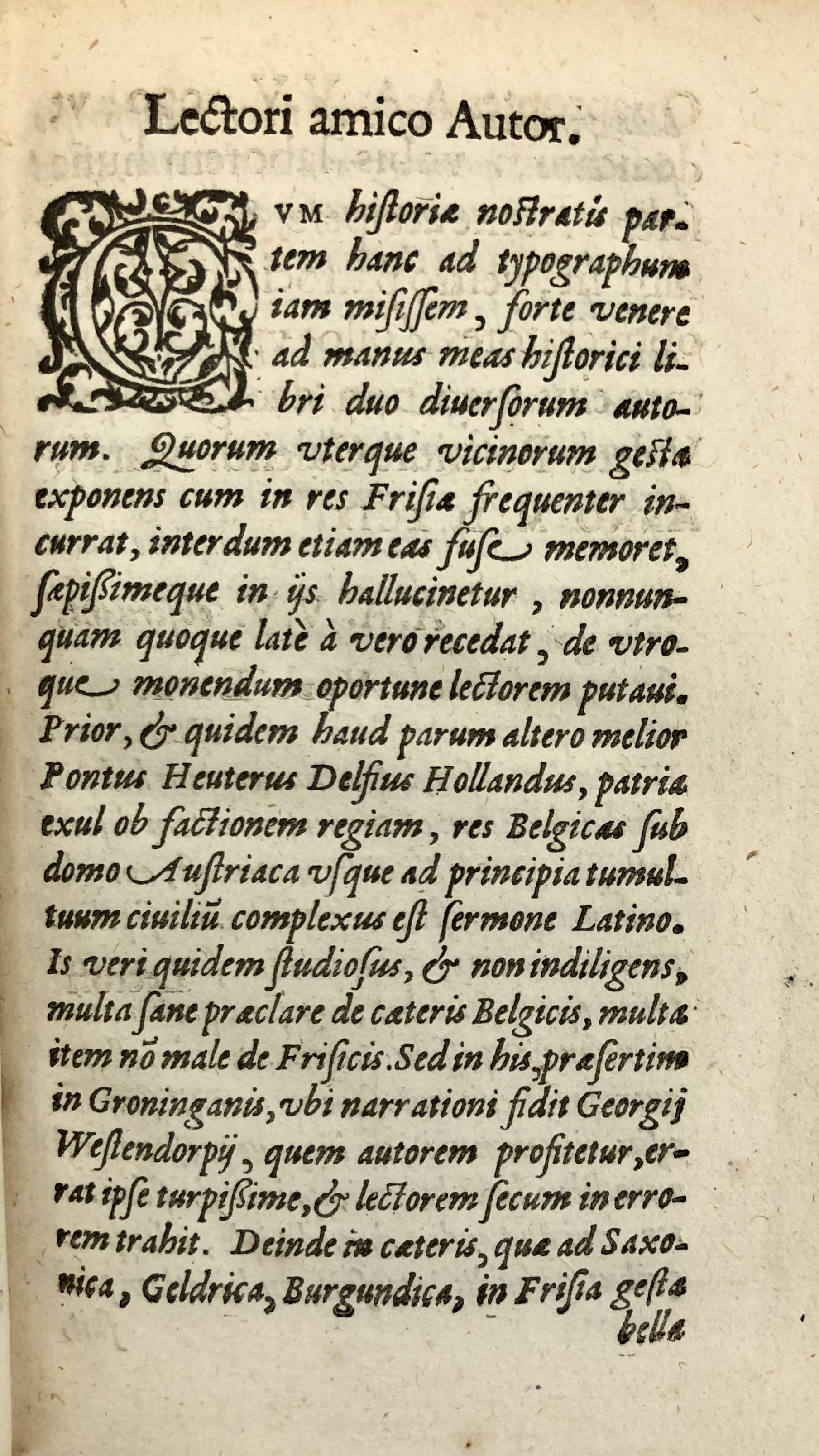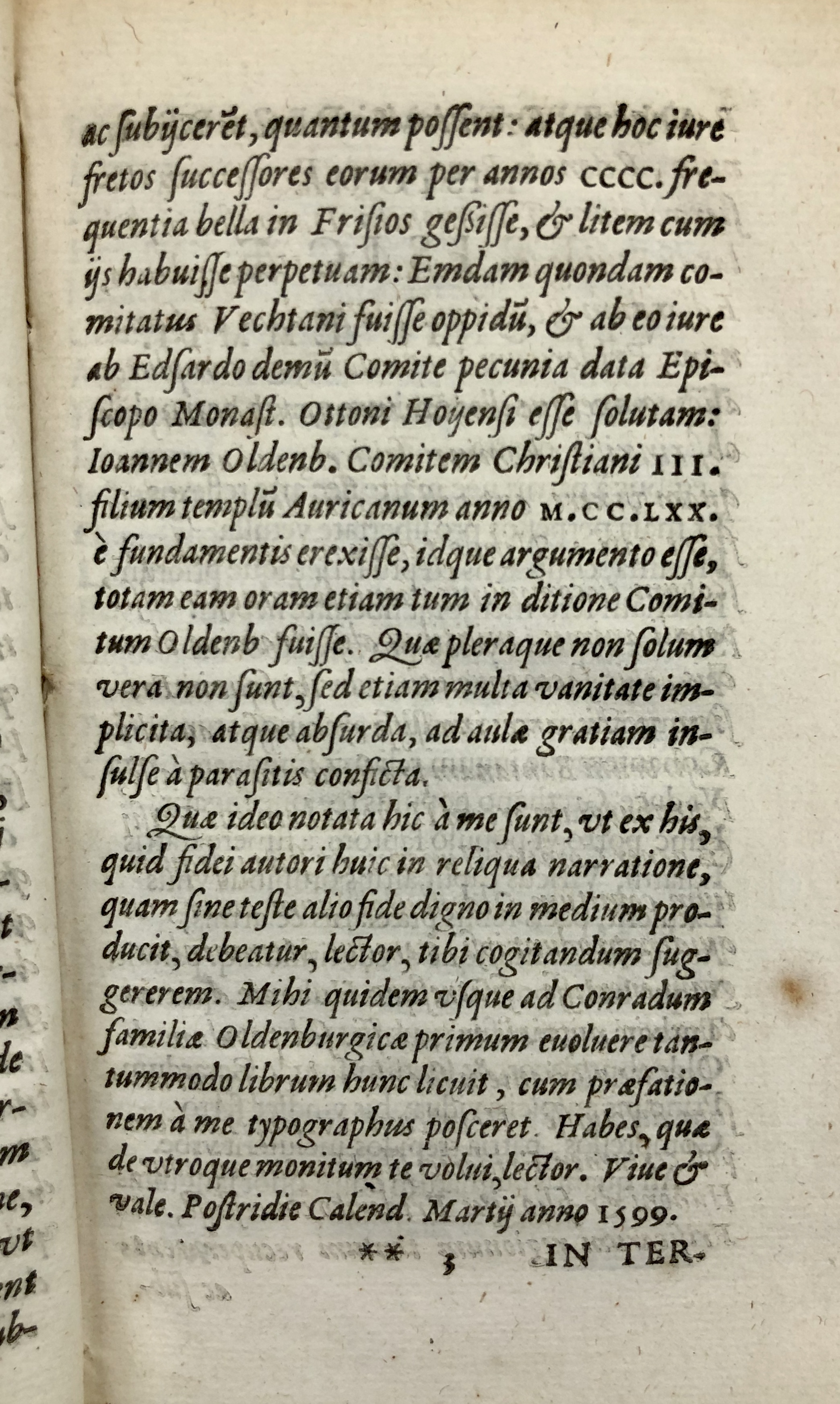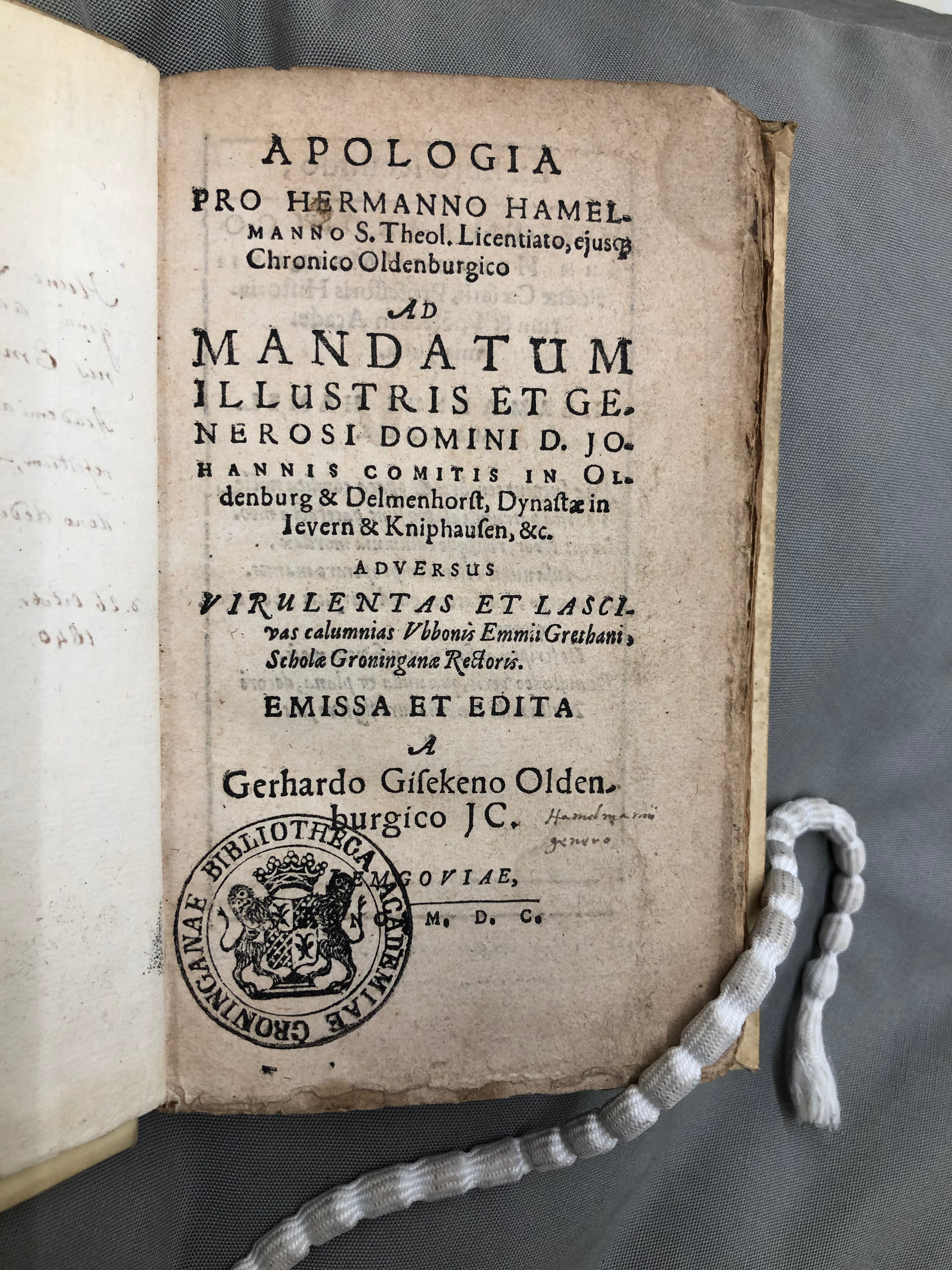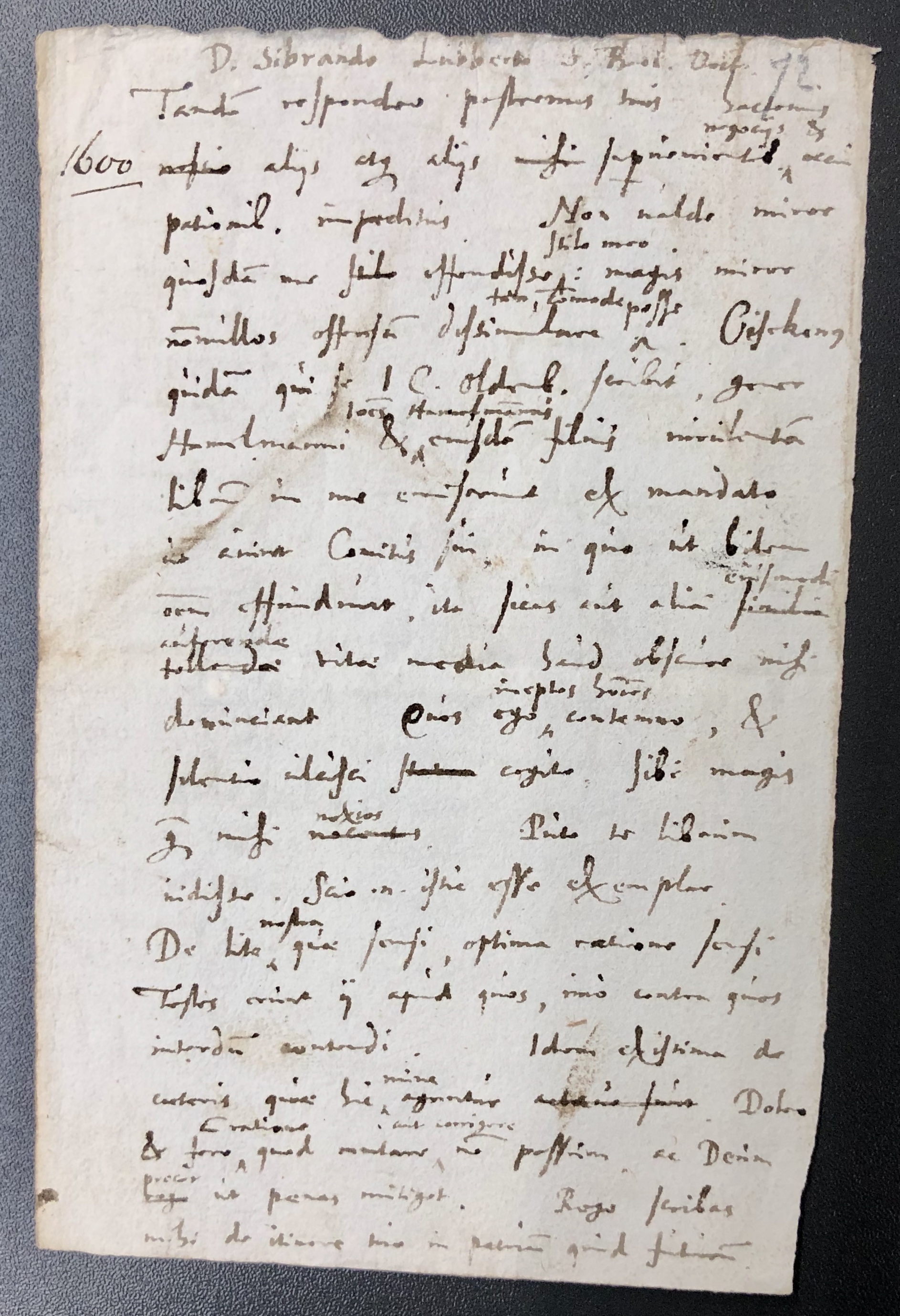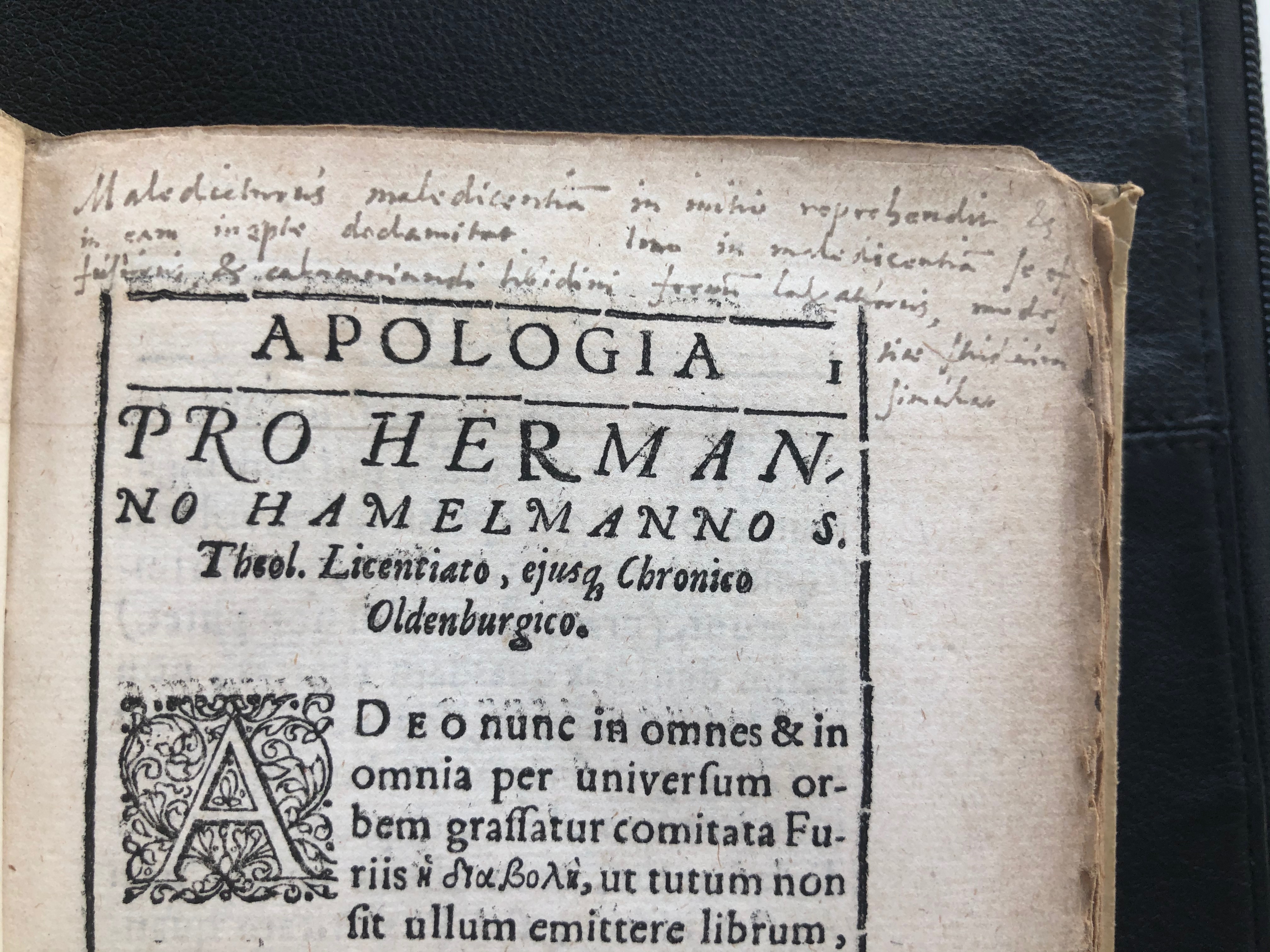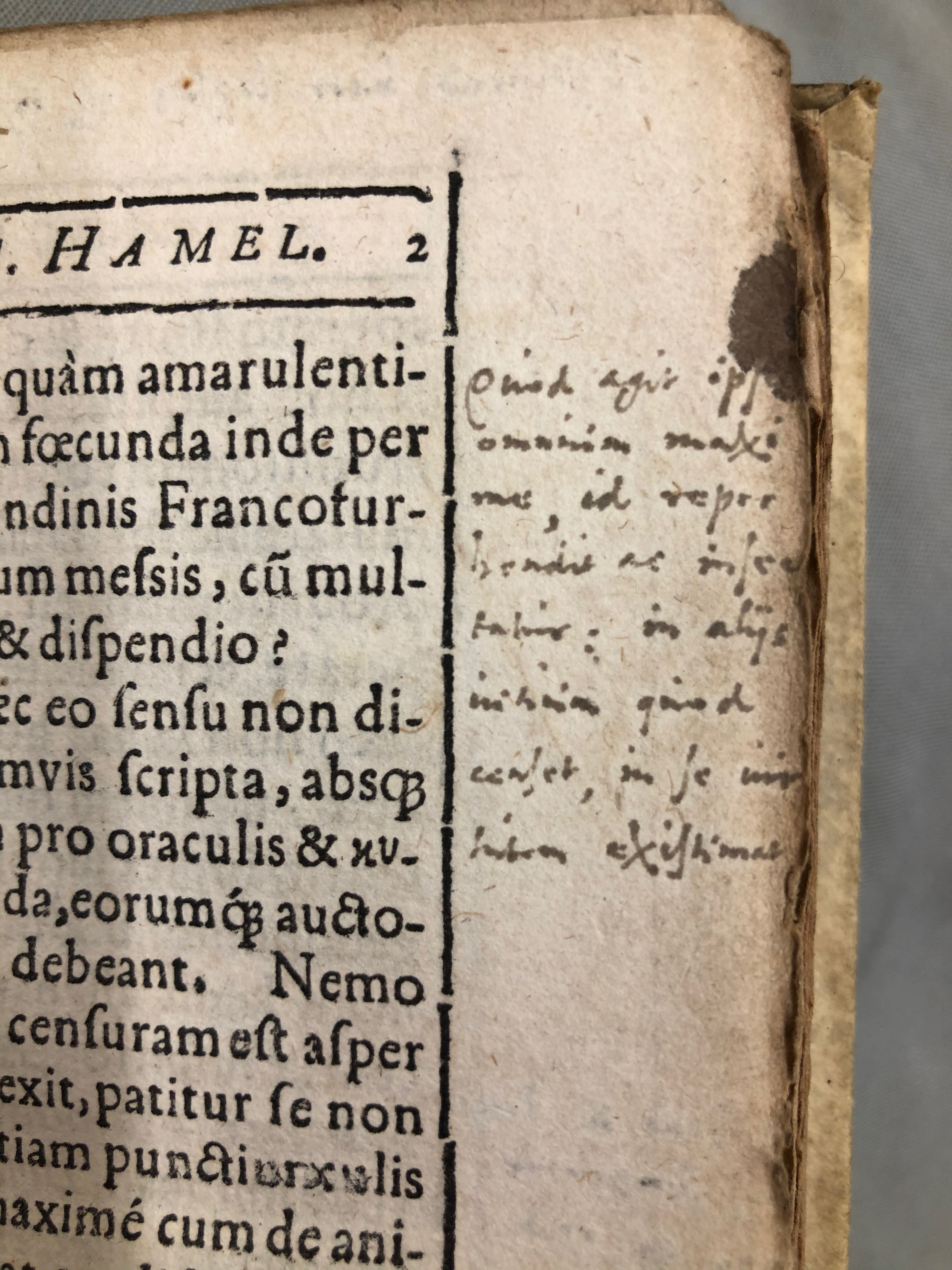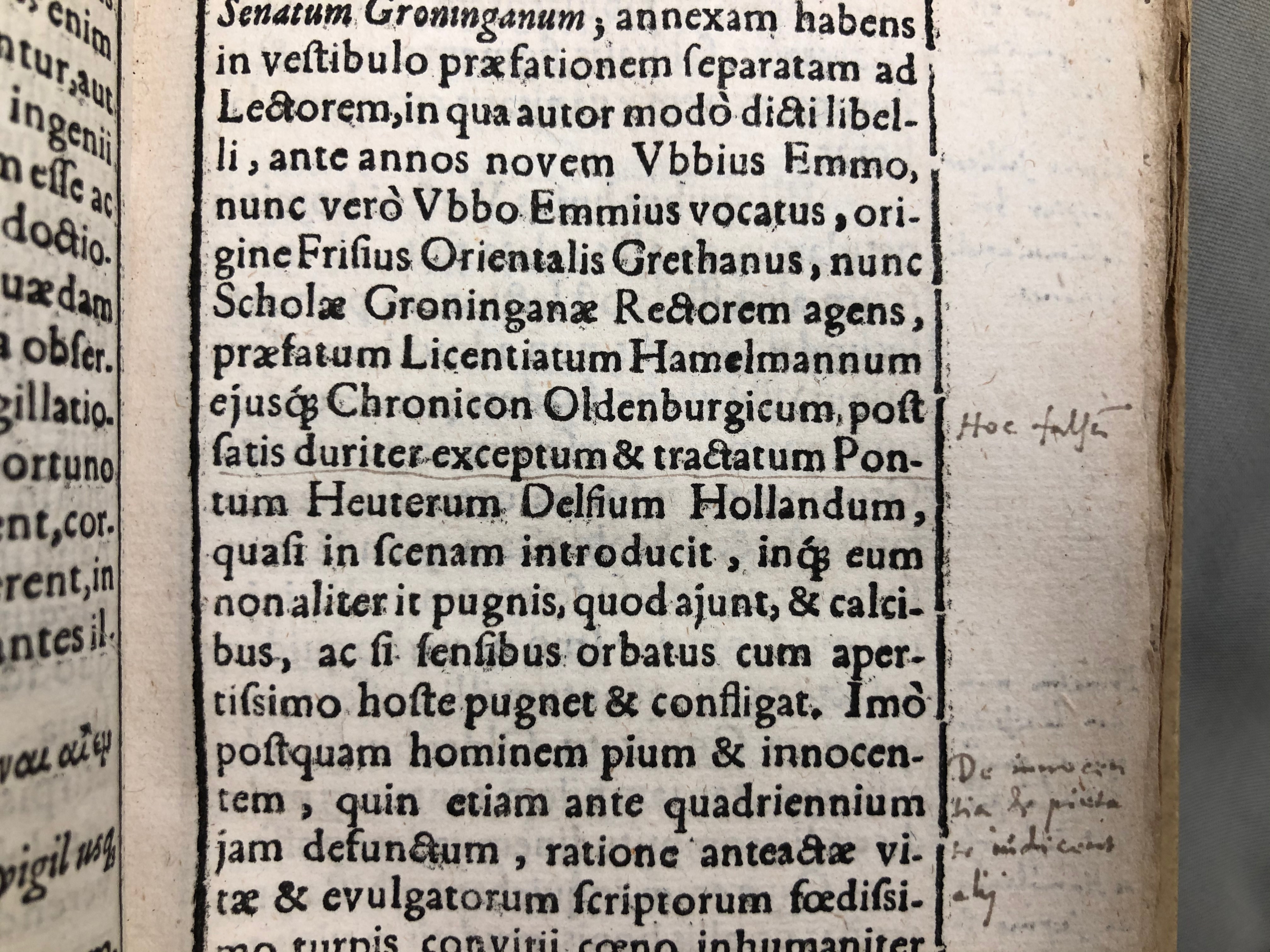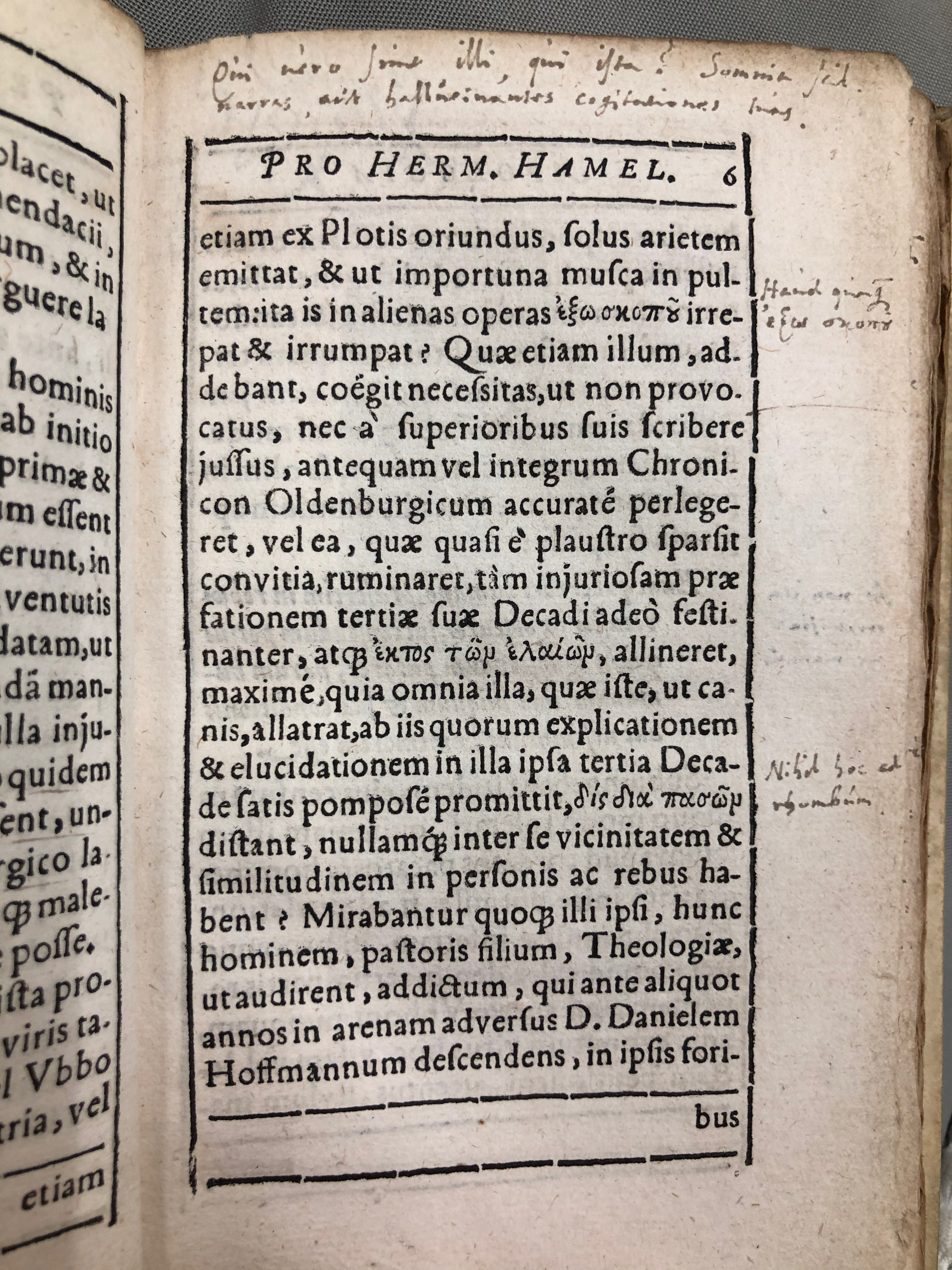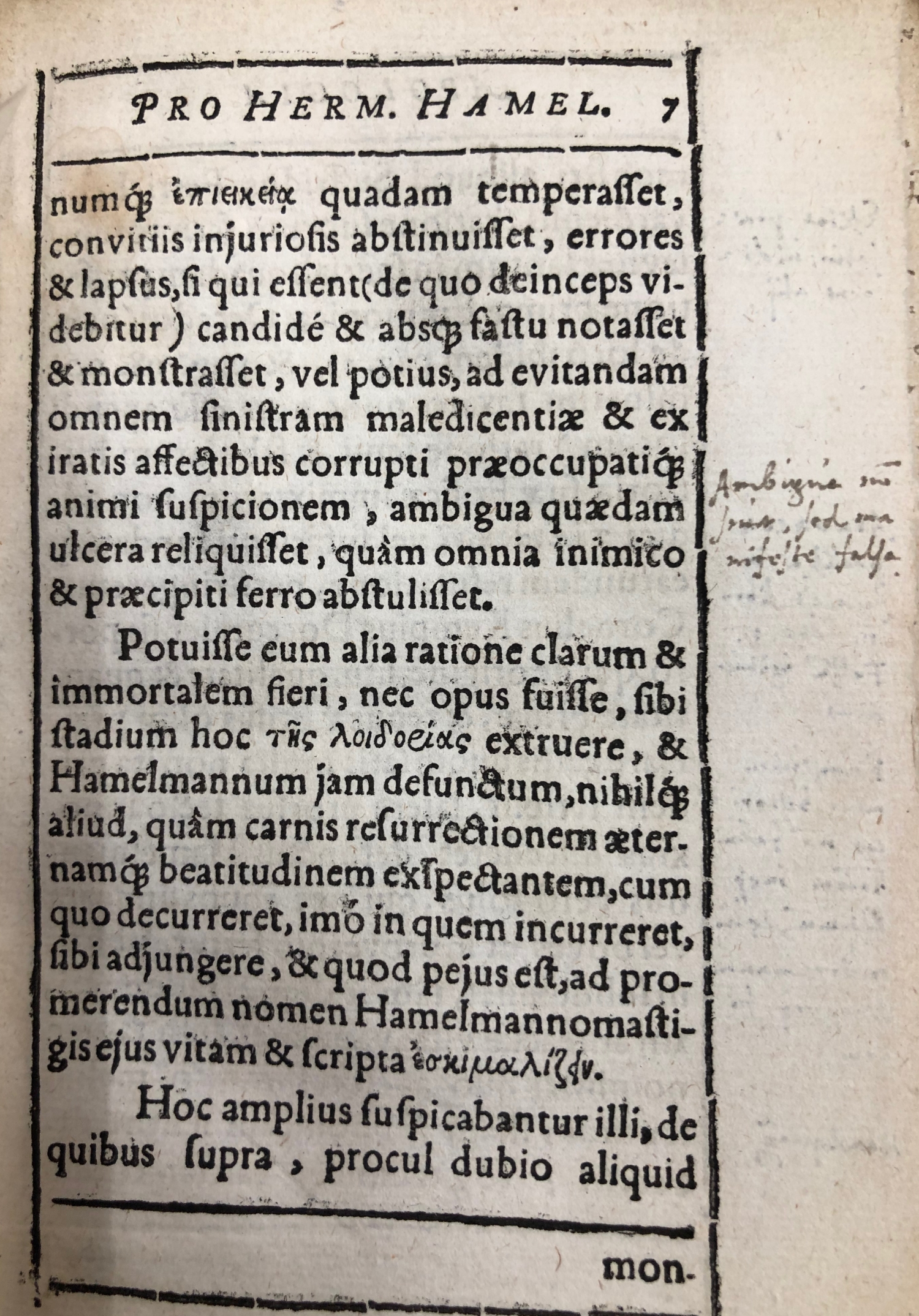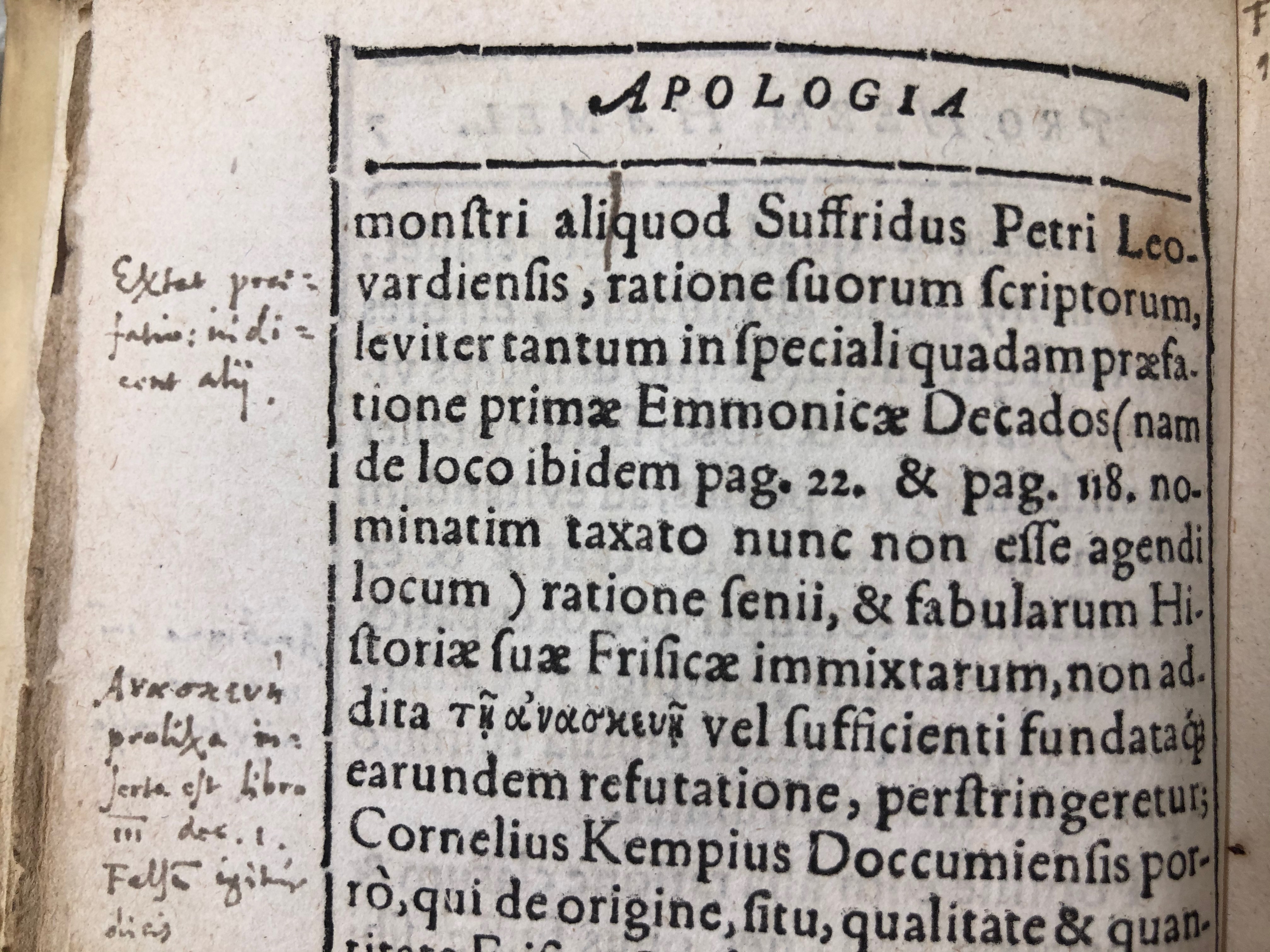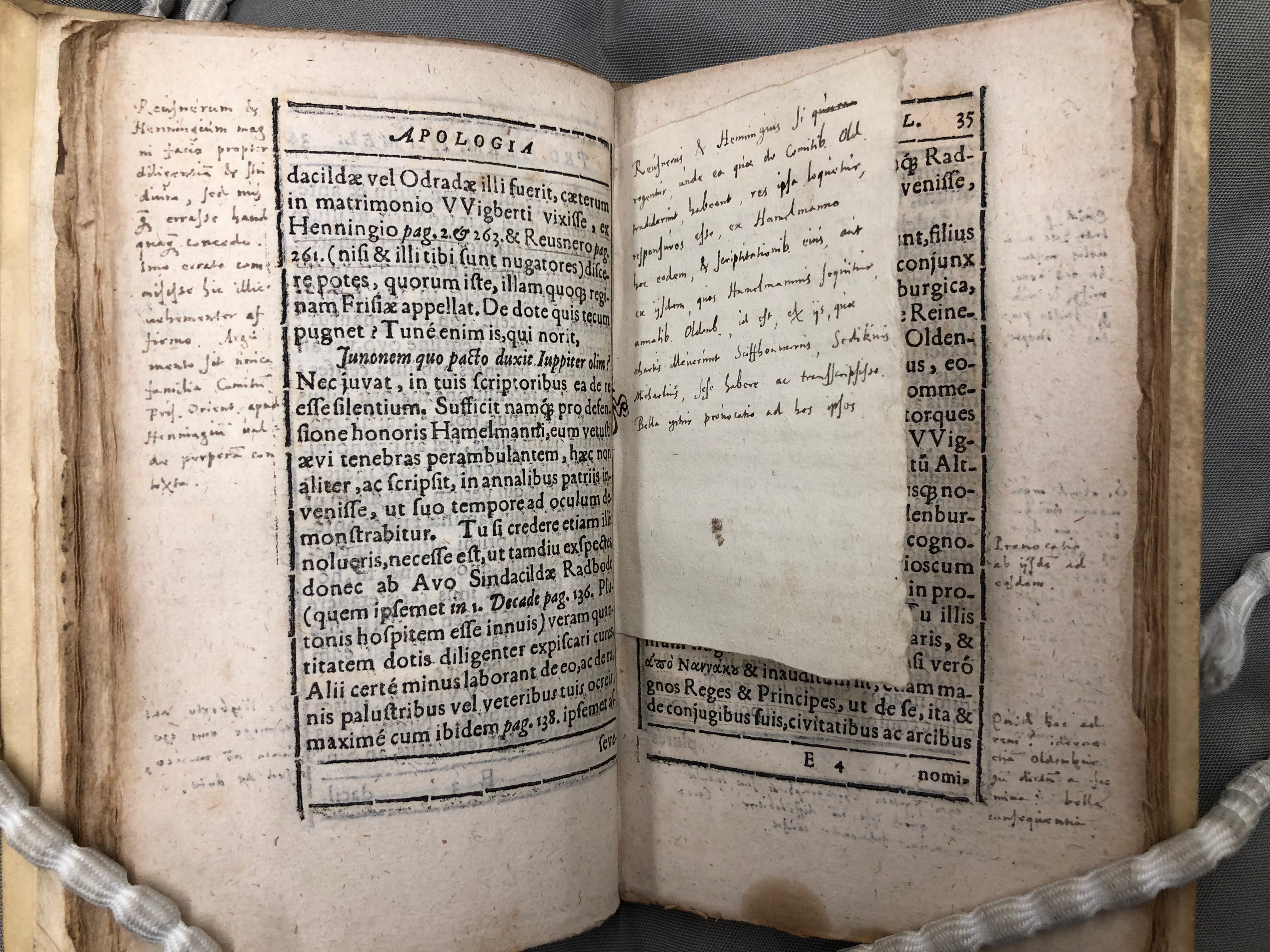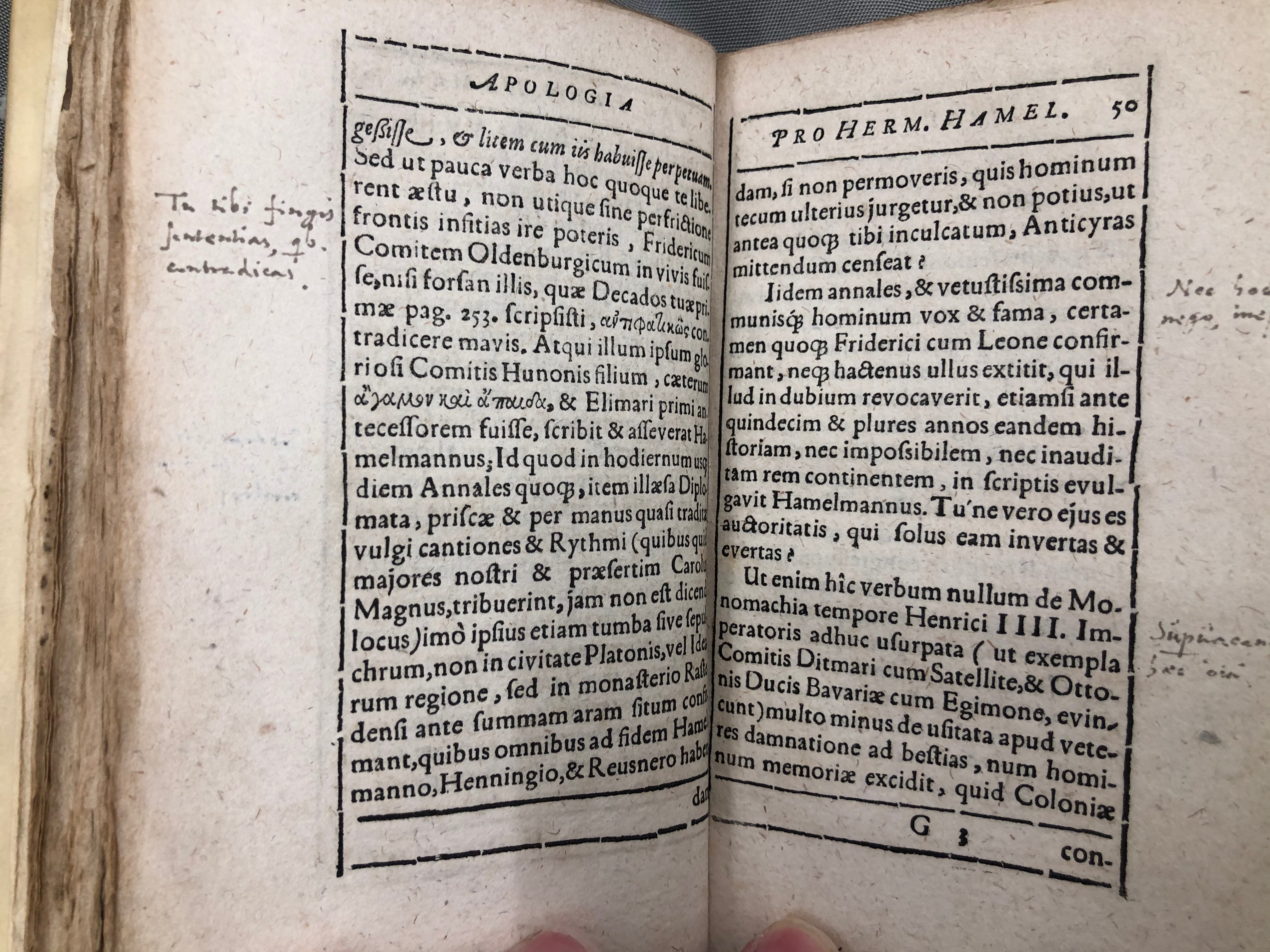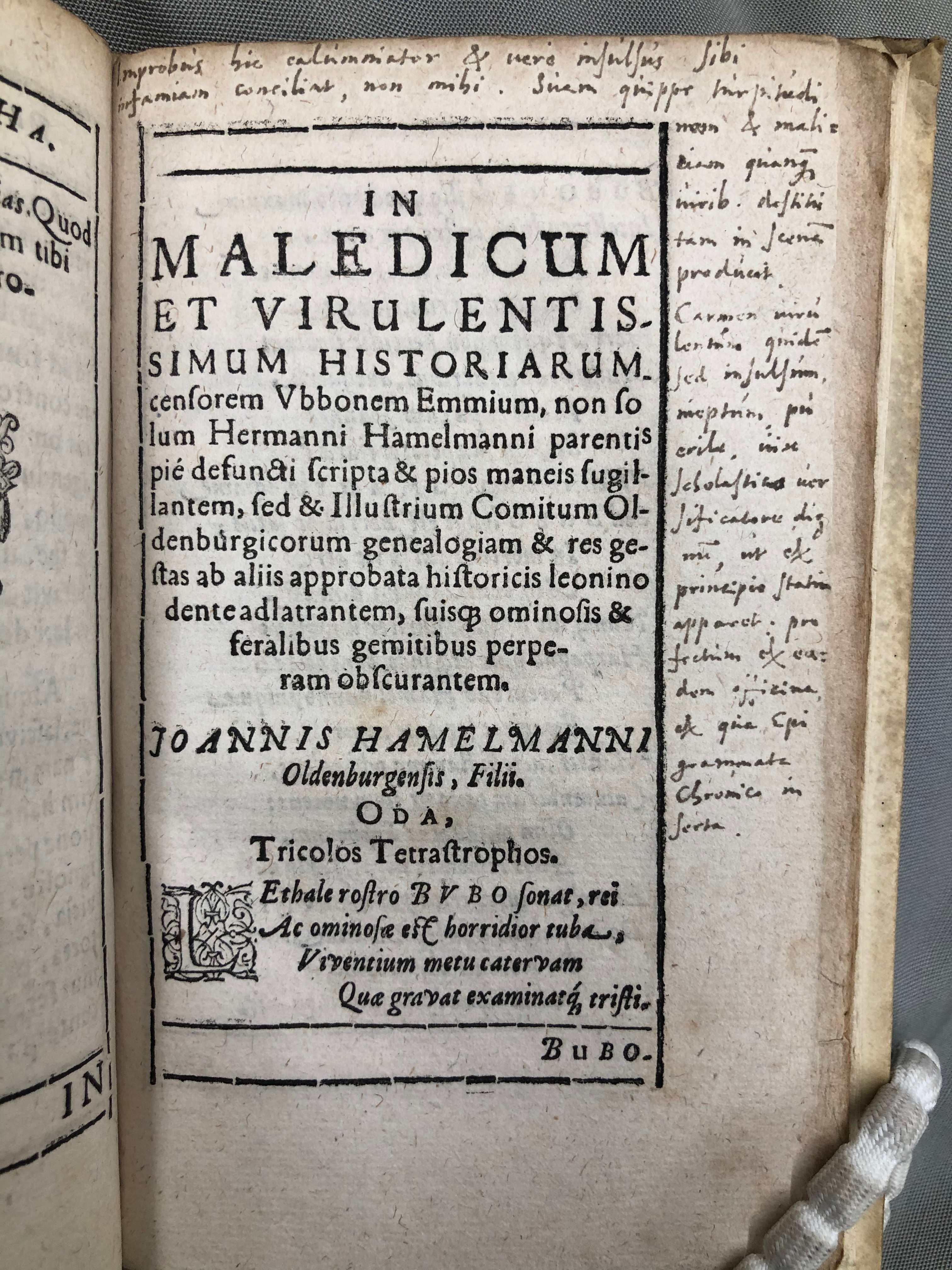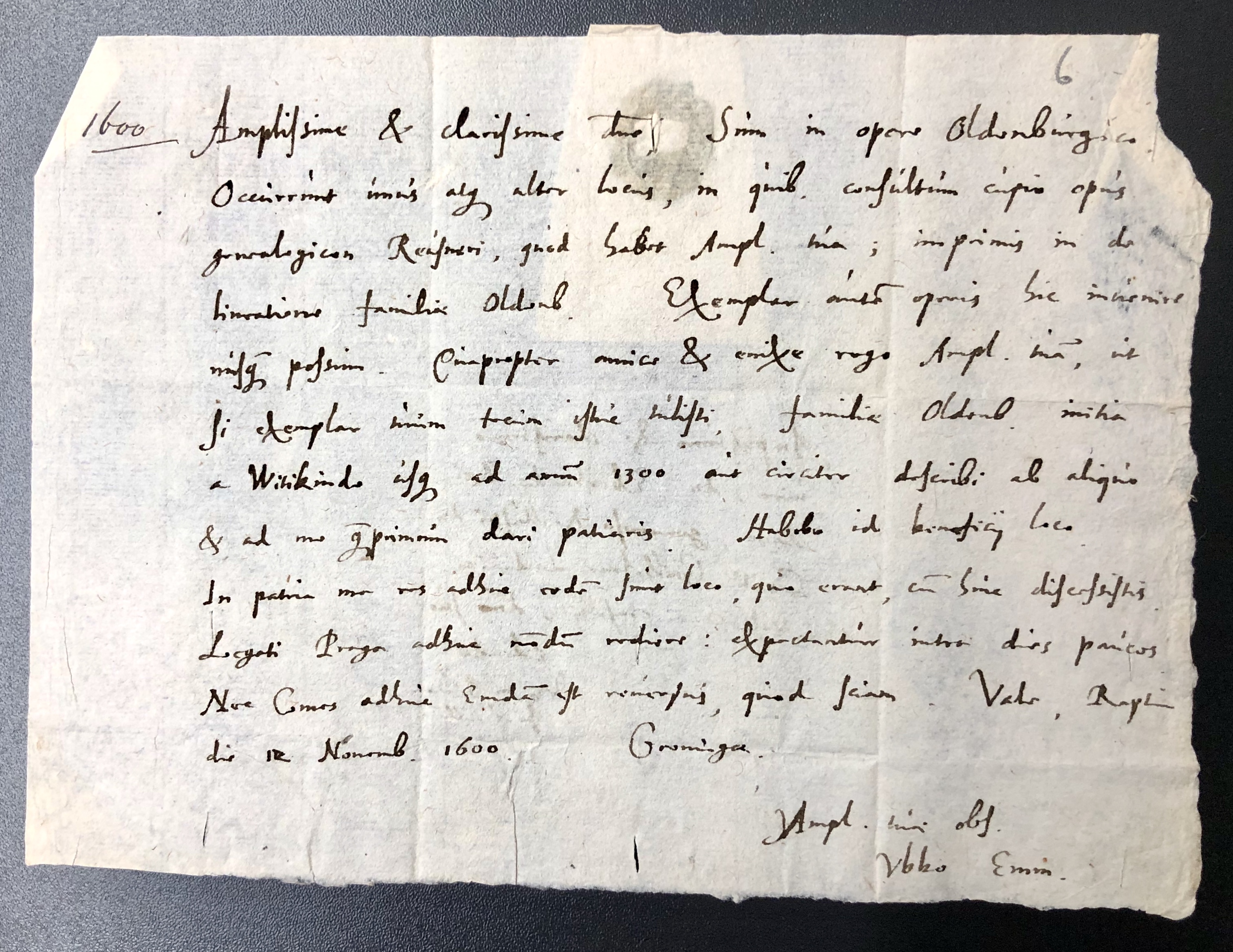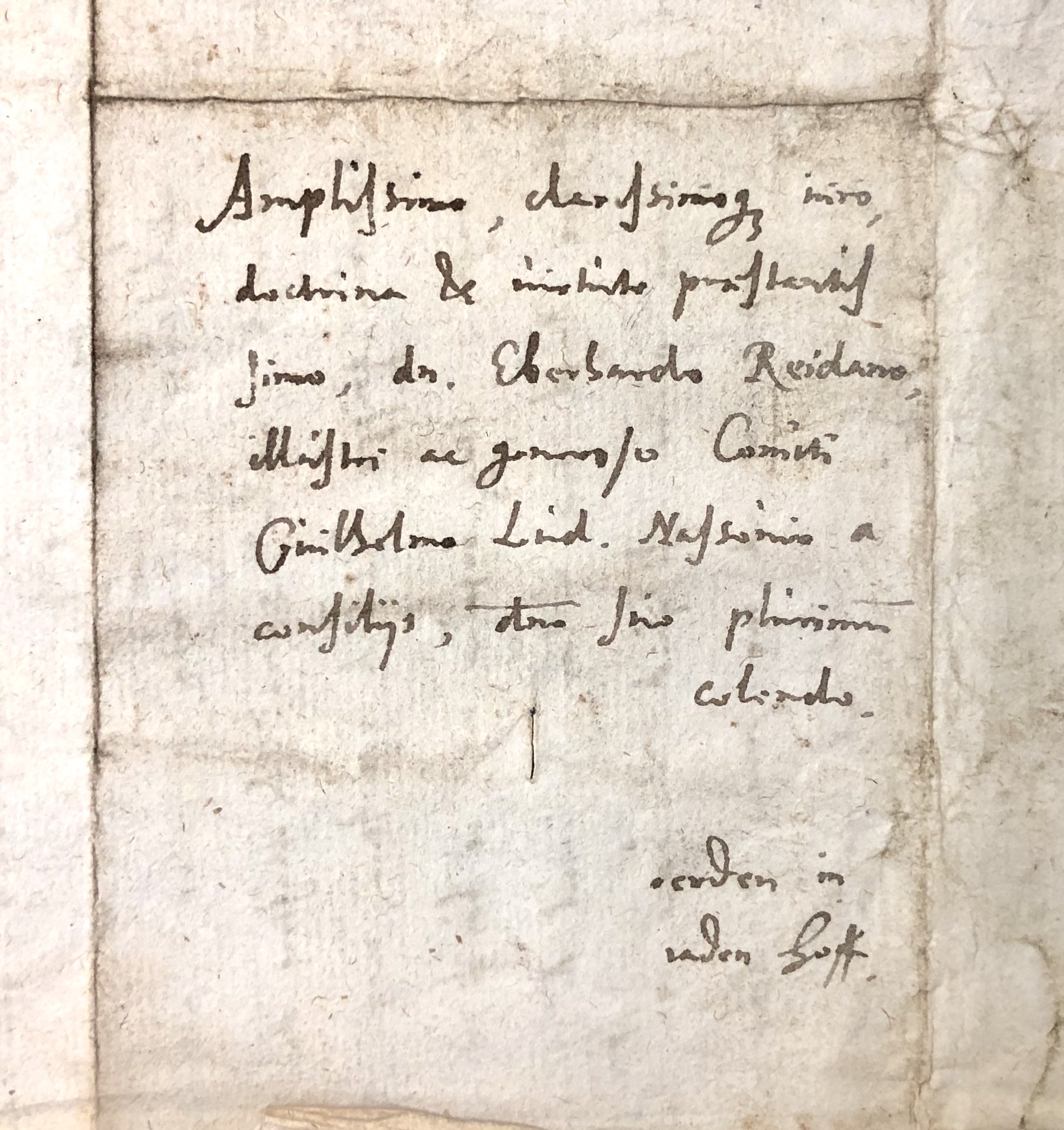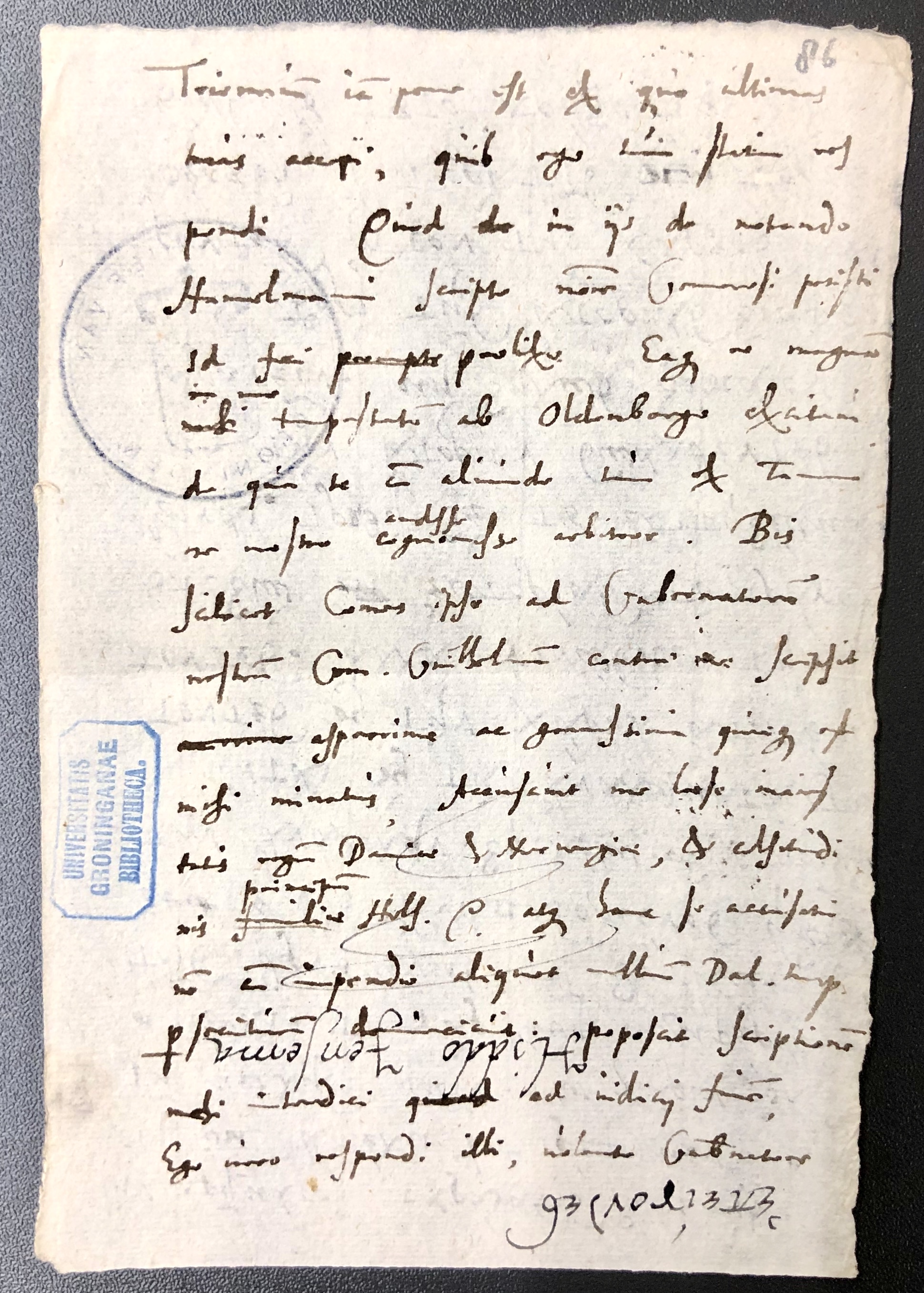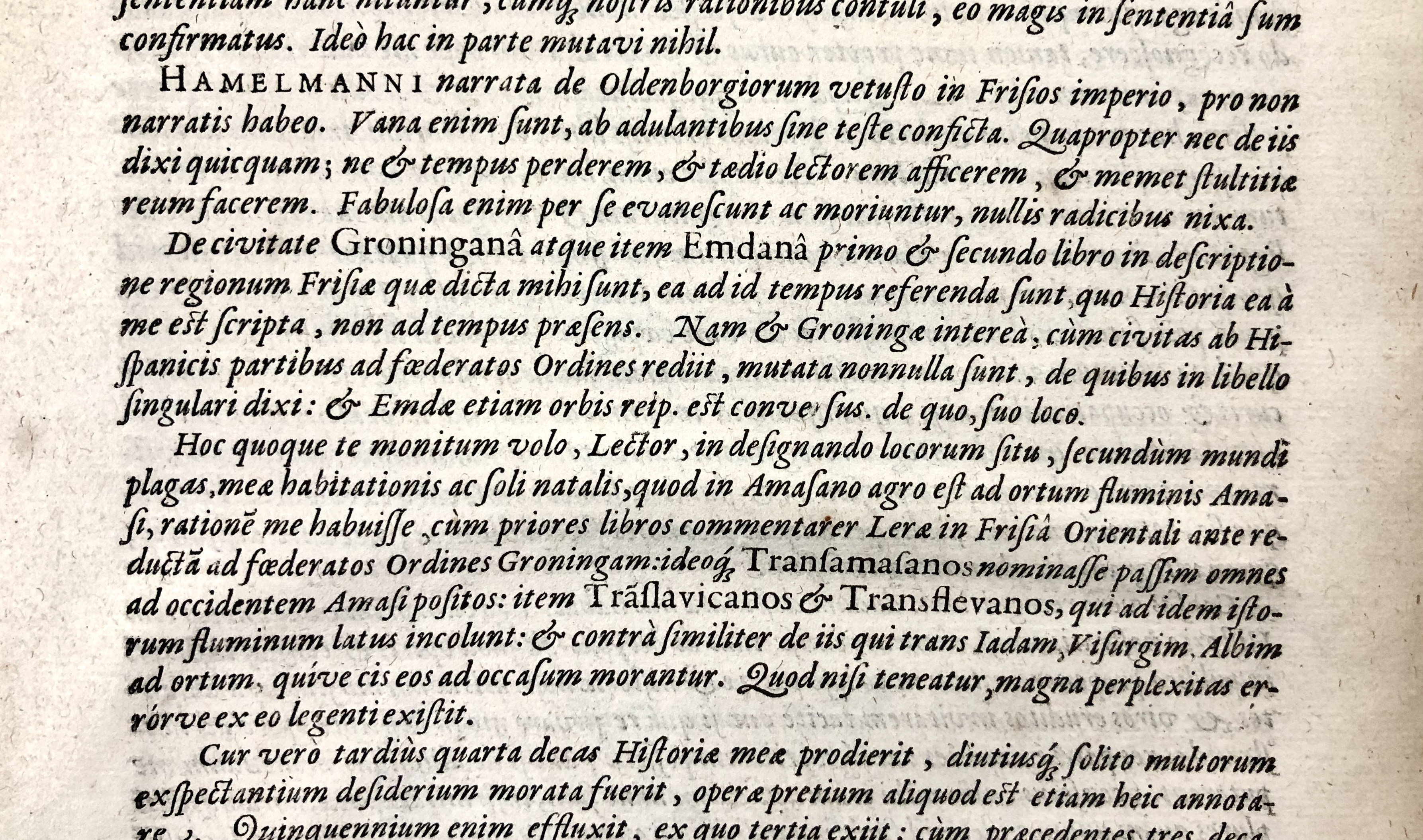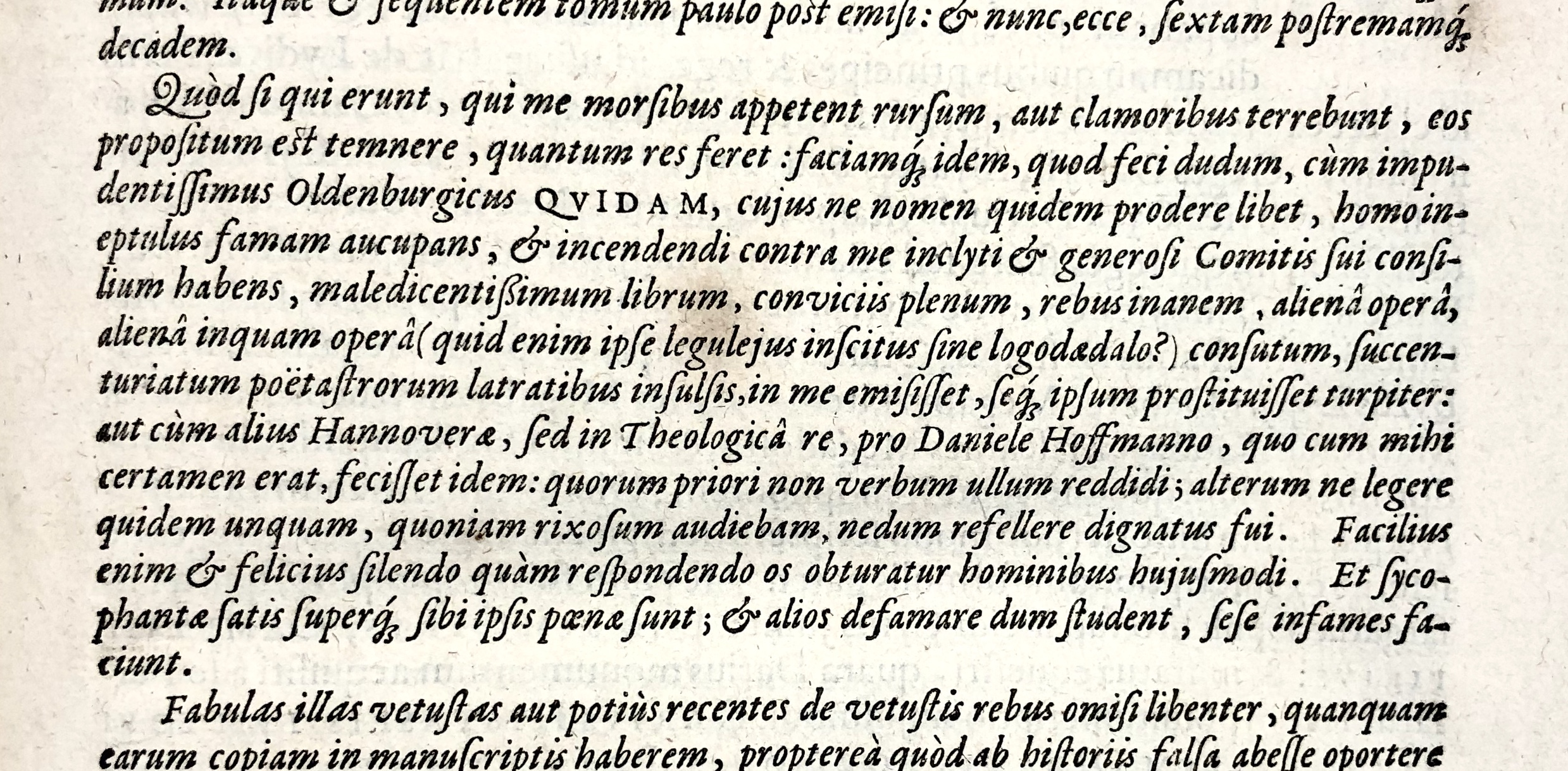400 Years of Groningen and Oldenburg
“This evil and tastless slanderer is a disgrace to himself, not me, because he showcases his own tomfoolery and wickedness, even though it is a feeble attempt. His poem is poison, but tasteless, foolish, childish, and not even equivalent to a nursery rhyme.”
The relationship between Groningen and Oldenburg has not always been as cordial as it is today. Right now we are celebrating 40 years of collaboration between our universities, but the first rector of the academy in Groningen had had serious issues with Oldenburg since well before our university was founded. So what was the problem?
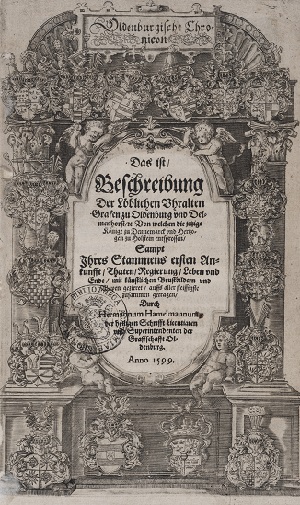
It all started with a book (ill. 1). The Lutheran theologian and historian Hermann Hamelmann (1526-1595) wrote a chronicle of Oldenburg, in which he tried to relay the history of the county and the family of the counts to as far back as possible. This was at the behest of Count Johann VII of Oldenburg and Delmenhorst (1540-1603), who had appointed him the court’s historian. He completed his works in 1593, but they were not published immediately. As it turned out, the Count was not satisfied with the results for several reasons, particularly the information regarding the dynasty and politics. Based on Hamelmann’s historic reconstruction, the Count’s brother, Anton II of Delmenhorst, could be entitled to Delmenhorst as a formally separate part of the county that had previously been joined. To suit his own needs, Johann had ordered an adaptation of the works of Hamelmann. Only the edited version of the chronicle was published, in 1599, four years after the death of the author.
It was not the first and it would not be the last time that scholarship and politics clashed—something that, in the short term, usually comes at the expense of scholarship and the truth, but in the long term rarely does (Hamelmann’s original version of the chronicle was ultimately published in 1940). What’s more, what exactly constitutes the truth? Is truth just a type of alternative facts, as a prominent politician of our time likes to claim? This question plays an important role in the clash between Groningen and Oldenburg, which we will discuss next.
In his Oldenburgisch Chronicon, Hamelmann claimed, for example, that the family of counts was related to Friso, the fabled founder of the Frisians (the Frisian Romulus as it were) and that the Oldenburg counts possessed ancient rights to the eastern part of Friesland, because supposedly they were the descendants of Widukind, the Saxon hero who had been the great rival of Charlemagne back in the eighth century. Based on this information, the Count of Oldenburg laid claim to parts of East Friesland (ill. 2).
Ubbo Emmius was a Frisian. He hailed from East Friesland to be precise, as he was born in Greetsiel on the coast where the river Ems and the Wadden Sea meet. He had been rector of the Latin school in the city of Groningen since 1594. He was also a historian through and through. This combination had resulted in a book about a history of the Frisians—something he would publish under the title of Rerum Frisicarum historia. He published the first part, consisting of ten chapters, in 1596. Two years later, part two was published and in February of 1599 he had just submitted the copy for his third decade to the publisher when he was confronted with Hamelmann’s Oldenburg Chronicle. Of course he wanted to know what it said about the Frisians. They are mentioned early on in the Chronicle, where the earliest history of the house of Oldenburg is discussed. He was not amused by what he read; quite frankly, it greatly annoyed him (ill. 3).
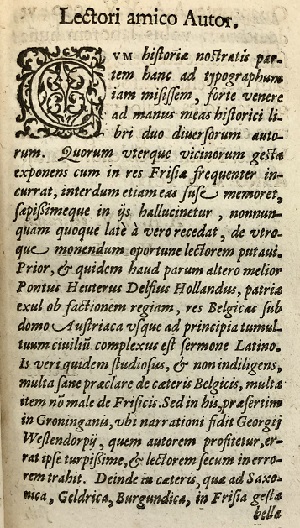
He decided to immediately include a warning against the alleged nonsense he had read in his own edition of Frisian history. He felt compelled to do this. Had he not dedicated part two of his book to Count Willem Lodewijk of Nassau-Dillenburg (1560-1620), stadtholder of Friesland, the year before? And in it, had he not spoken highly of historical truth and reliability? “It was mainly my intention to be as truthful as possible from the beginning of this study and to write with as much certainty as possible about old and obscure subjects and to relieve history of fables … I consider it the duty of everyone who declares to write a recount of events that they do not intentionally derogate from the truth, out of jealousy, hatred, hope or fear, and that they put in the greatest effort possible to not leave out anything intentionally and to spare no effort in bringing to light what they want to be known forever with as much certainty and truth as possible. It is my firm intention to keep a straight course, regardless of the good or evil consequences that I may experience at the hands of other people. My reward in itself will be rich enough, namely the revealing of the truth and the sympathy of those who cherish the truth.” (*3r-*6r)
These words clearly show that Emmius believed in the existence of the truth as an objective fact that could be reconstructed—something modern-day historians view differently. This makes it understandable that he decided to warn his readers about Hamelmann’s chronicle. First he emphasised the urgency of his act, because he mentions explicitly to the reader that he decided to write these words after he had already sent the copy of this part (three) to the printer. Only then did he receive, by his own account, two books by two historians in which historically inaccurate comments were made about the Frisians. He believed informing the reader of these facts was the right thing to do. One of the books was Hamelmann’s chronicle. Ubbo writes (**r-**3r):
“The author who declares to write about Oldenburg in the German language is much worse and more foolish [than the first author Emmius warns about]. Endless fables sold as history! He is Hermann Hamelmann, who died very recently. There is nothing interesting about him but his name. After all, it is a well-known fact based on his life and previous books that he was even a terrible writer about things that mattered to him. What I mean to say is that he even confused and tarnished the names of the most famous noble families in Germany. After all, it should not be surprising that those who knowingly and wittingly sell hot air as the truth, should find their other products (even the ones that are accurate) to be viewed with a dose of scepticism and contempt. But what rational human being who is only a little bit familiar with our Frisian ancestors will this blabbermouth be able to convince with what he printed in the first two parts of his book? I have not been able to read the rest yet ….” Then, Ubbo extensively cites the claims that Hamelmann makes about ancestors of the Oldenburgers in relation to their power over the Frisians. “When I read that I could hardly contain my laughter, I have to admit.” Next, he explains what he believes are inaccuracies and untruths in Hamelmann’s works. In conclusion, he states that: “All of this is mostly untrue and is often based on hot air or is just completely absurd, a tasteless imaginary tale dreamt up by sycophants to get in the court’s good graces. I have touched on them here to give you, the reader, the opportunity to think about the question of which trust do you owe this writer in reading the remainder of his writings, when he does not bring forward any reliable witnesses?” (**3r) (ill. 4)
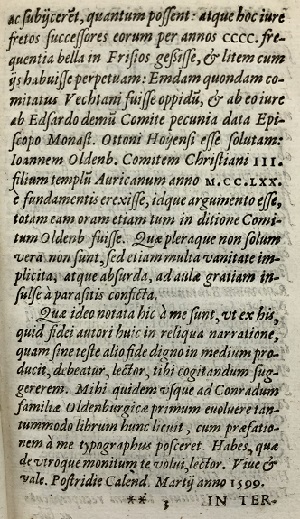
In this context, mention must be made of the remarkable fact that Gerhard Gisecken (more about him later) in his defence of Hamelmann claims that his book was not released until after 2 March 1599, but Emmius dated his warning to the reader 2 March. Emmius also writes that he has not been able to read Hamelmann’s book in its entirety, only the beginning. It’s there that the connection between Oldenburg and Friesland is discussed. Also, at the time (until well into the 19th century) books were printed and sold in quires, whereby the printer cum publisher would only bind the collections of quires with a weak and temporary binding. The buyer was expected to have his purchase (in the form of a loose stack of quires) properly bound himself. Emmius will therefore have received one or more quires before the printer/publisher had marketed the complete product.
Emmius’ criticism was not without consequence. In November of 1599, Count Johann of Oldenburg himself decided to send a letter of complaint to Count Willem Lodewijk. For slander and defamation of character, he demanded an apology from Ubbo, whom he called a “gifftigen Calumniatorn und Lesterer” [poisonous gossipmonger and slanderer] and dismisses as an unknown schoolteacher. Emmius had called the Oldenburg Chronicle “mehr nichts dan Fabulwerck, Narrentheding, falsches erlogen und von den Schmeichlern dem Hove dardurch zu liebkosen erdichtet ding” [nothing more than a fable, foolishness, falsehoods and lies and a fantasy meant to flatter the court]. This slander was unprovoked “und darumb thuet uns auch nicht unbillich wehe, das wir sambtlich von diesem Ubben oder Buben so unverschuldeter sachen traducirt und in den buchladen umbgetragen werden” [and that’s why it severely hurts us that this Ubben or Buben blames all of us undeservedly in the bookshop]. The stadtholder must hold Emmius to account, declare him to be in the wrong and impose a publication injunction! In short, the Count responded as many autocrats before him and after surely would.
Letters written bij Emmius to acquaintances—and the University of Groningen has in its possession many of the original copies—clearly demonstrate how the situation unfolded. In December of 1599, Emmius sent a letter to Willem Lodewijk in his own defence. The original copy of this letter is located at the Niedersächsisches Landesarchiv in Oldenburg, because the stadtholder included this letter as ‘evidence’ which he sent to Count Johann. On 2 January 1600, Emmius wrote to Otto Friedrich von Wicht in Emden: “The Count of Oldenburg seriously threatened me in a letter to our stadtholder for the comment I included in my history about the vanity of his man Hamelmann, who was out to do injustice to our homeland. He threatened to impose on me a very serious charge due to a supposed wrongful insult and has asked to have me silenced, for as long as I refuse to atone for my sins. At the same time, he showed that he had little doubt that I wrote my words at the insistence of those who now reign supreme in our home country and mainly at the request of the ruler himself ... I have answered the Oldenburger in both an understated and direct manner. What happens next is up to God.”
Ubbo had answered the stadtholder that he had not meant to insult anyone with his harsh words regarding Hamelmann, but that he had wanted to serve and defend the truth. When someone is less than truthful, that to him is reason enough for criticism, because the truth is “dat levent und ware wesent der Historien” [that living and breathing being that is History]. A historian should be able to research and report the truth without discrimination. Without freedom of writing and criticism, historical truthfulness cannot be guaranteed. In his opinion, it served the family of the Count well that a competent historian would distinguish fact from fiction, something that Hamelmann had failed to do (and in bad taste), which is why he “die Historische Waerheit ... einen swaren slach an den backen gegehven (hefft)” [had dealt the historical truth a forceful blow]. Willem Lodewijk enclosed with this defence by Emmius a letter in which he defended Ubbo the human being’s sincerest intentions. According to the stadtholder, historians required freedom of writing.
Undoubtedly, it did not help Ubbo’s case that he had a sharp pen and a ruthless directness. In his words, he wants recto pede pergere (to be straight forward). In his life he always had fierce supporters and fierce opponents. However, we should also place his words in the context of the ongoing debate at the time about the question of which criteria a historian should use to determine the reliability of a source. For the humanist Ubbo Emmius, the reliability of the word of classical writers was beyond reproach. This is why, in his Rerum Frisicarum historia, he did not waste a word on the Frisians of Antiquity, because that history was written by classical authors. He does not cite any local sources about those early days, contrary to the Frisian landhistorian Suffridus Petrus. In Ubbo’s view, Petrus is a fraud because he is unable to answer the questions that should be asked of every source: when, where and by whom was this story written? Anton Rinzema (1994) calls this ‘an overly absolute concept of truth’. For Ubbo there is only one truth, not only in theologicis, but also in historicis. He opposes conscious subjectivism but Rinzema for example observes that Ubbo in his history of the Frisians becomes milder in his judgement of the city of Groningen after he moved there in 1594, so from decade two onwards in his Frisian history. Nothing human was alien to him, apparently. Even so, according to Klaas van Berkel (2014) we can distinguish a Frisian history before Emmius and one post-Emmius, because he was the first one to apply the new methods of contemporary historiography to this theme.
Apparently, Count Johann was not satisfied with the Frisian response. He launched a counterstrike in the media and had Gerhard Gisecken, an Oldenburg legal scholar, publish a defence of Hamelmann and his chronicle in order to safeguard the reputation and claims of the noble family. This Gisecken was Hamelmann’s son-in-law. In no time at all he wrote a defence of over one hundred pages against Ubbo’s criticism of Hamelmann by picking it apart and refuting it word by word. It appeared in the spring of 1600—in a handy pocket-size and in Latin, which at the time was still the international language of scholars and also the working language of Emmius the historian, who had also expressed a negative opinion about the fact that Hamelmann’s chronicle was written in German.
Illustrations 1 - 5
Emmius was soon able to get his hands on a copy. On 12 January 1600, he wrote to Sibrandus Lubbertus, Professor of Theology in Franeker: (ill. 6) “Hamelmann’s son-in-law, a man named Gisecken who writes that he is a legal scholar from Oldenburg, and Hamelmann’s son Johann, have written a vile publication about me, commissioned by their Count (as they say) in which they do nothing but spew bile and make unveiled threats about coming at me with a dagger or similar ways of taking my life. I despise these foolish people, who do more damage to themselves than me, and I am quietly plotting my revenge. I think you must have seen the book because I know there is a copy where you are.”
A month or two later he writes to the same Sibrandus: “I will send you the endless answer of the Oldenburger, in which you will be able to see a cutting paragraph aimed at me. I have underscored the most important facts with charcoal in the margins. Please hold on to this until you have a suitable messenger who could send it back for you. Enclosed is a mixture of slander and accusations levelled at me by Gisecken for you to peruse at your convenience. I know that the lord secretary Eco Isbrandi [Secretary of the State of Friesland] has a copy of these you could use, but I would rather you see my copy here because of my notes in the margin as an antidote to the slander. I would like to ask for your advice: should I answer the slanderer or simply despise him? I am more inclined to do the latter but my friends have varying points of view.”
Emmius’ private copy has not been lost (see also ill. 5). In 1832 it was included in the estate of the archivist of the province of Groningen. The University Library must have purchased it at the time because it is now in our possession. This means we can now read and assess Ubbo’s notes in the margins. Here are several examples:
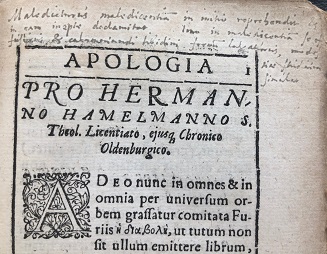
(ill. 7) p. 1r: “Right before he begins to speak evil of me, he denounced the concept of speaking evil of anyone and has a strange way of attacking the principle. Yes, before he starts to run his mouth and speak evil of me and gives his desire for slander free reign, he feigns a desire for self-restraint.” Ubbo writes this comment at the beginning.
(ill. 8) p. 2r: “What he himself does best, is what he denounces and criticises: what he sees as a character flaw in others he sees as a quality in himself.” This is what Ubbo writes where Gisecken wonders what unbridled slander leads to except for bitterness and arguments, except profit for publishers at the expense of many others. He does not want to maintain that every written word is above all criticism, because you would be hard-pressed to find a single good author who has always scorned criticism and has never allowed for any corrections, as long as the criticism is sincere.
(ill. 9) p. 5r: “This is not true.” This is what Ubbo writes where Gisecken claims that “Ubbius Emmo, who is now called Ubbo Emmius” first aggressively deals with the historian Pontus Heuterus of Delft and then brings up Hamelmann and his chronicle whom he proceeds to kick, slap and punch as though he were a madman.
p. 5r: “Let others make judgements about innocence and piety.” Ubbo writes this next to Giseckes statement that Ubbo was so inhumane as to disgracefully drag through the mud a pious and innocent man who had been dead for four years, by calling him names and insulting his writings, calling his chronicle a stack of lies and fabrications, a non-history, hot air and emptiness.
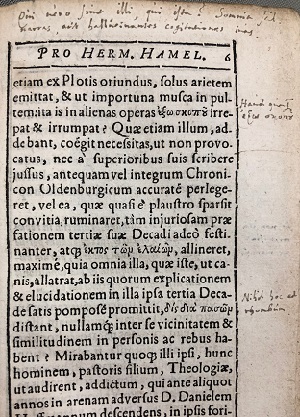
(ill. 10) p. 6r: “But who were the people who said this? Of course you share your dreams and your own fantasies.” Ubbo writes this next to the passage where Gisecken explains that people who heard about the behaviour and extreme criticism of Emmius, struggled to believe that it was true, especially considering his position as the educator of young people. They said: “Why is this Emmius so rude that he acts like a modern-day Archilochus and strikes down other people’s work, where decent scholars have nothing to criticise?”
(ill. 11) p. 7r: “These are not uncertainties, but clear lies.” This is what Ubbo writes when Gisecken claims that many would have been able to justify Ubbo’s criticism of Hamelmann if he had left out of his book various uncertainties in order to avoid a situation where people might (rightly) assume that all he wanted was to vilify, driven by malice.
(ill. 12) p. 7v: “The preface still stands: let other people judge.” + “An extensive rebuttal has been added in book 3 of decade 1. This means you are lying.” These notes are included in the margin where Gisecken introduces Suffridus Petrus as a victim of Ubbo’s needlessly cruel and unfounded criticism in the preface of his first decade.
Illustrations 6 - 12
(ill. 13) pp. 34v-35r: Ubbo wrote a lot of information in the margins on these pages and he even had an insert bound in. He writes in the margin: “High praise for Reusner and Henning for their diligence and enthusiasm, but I am not going to claim that they never made a mistake. On the contrary, I will emphatically claim that they did make mistakes on occasion. This is evidenced by, for example, the family tree of East Frisian counts that Henning got completely wrong.” Ubbo adds on the insert: “If we would ask Reusner and Henning where they found the information that they had collected about the Counts of Oldenburg, they would answer: naturally from the same Hamelmann and his writings or from the same Oldenburg annals that came before Hamelmann, in other words information we obtained from or copied from writings that Sciffhouwer, Sedikius, Michaelius committed to paper. An appeal to the same men, that’s great! This is his way of reacting to Gisecken’s comment: “... from Henning page 2 and 263 and from Reusner page 261 (if you do not see them as people who talk nonsense) you can learn ...” Here he refers to Elias Reusner and Hieronymus Henninges, who had each published aristocratic genealogies.
(ill. 14) p. 49v: “You come up with points of view in order to contradict them.” This is what Ubbo writes, when Gisecken cites and discusses a passage of Ubbo’s criticism of Hamelmann, namely where he talks about Count Huno of Oldenburg and his son Friedrich in connection with their claims to Friesland. Gisecken addresses Ubbo directly with the words: “At any rate, you will not be able to deny that Friedrich lived, unless you want to contradict yourself (first decade, p. 253).” This annotation reveals the heart of the issue, because to this day no historical sources have been found for Huno and Friedrich and the Counts of Oldenburg.
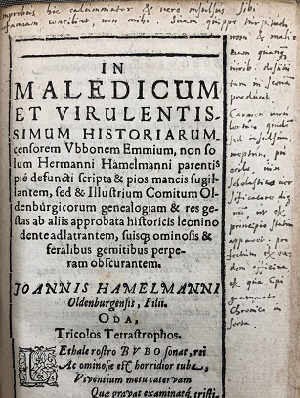
(ill. 15) Finally on p. 64r, we find Ubbo’s last handwritten note. In the printed version (after Gisecken’s defence) this is where a new section starts that consists of poems attacking Ubbo written by Johann Hamelmann, Hermann’s son. Apparently, Ubbo thought one handwritten comment was enough for this section. They are the words we quoted at the very beginning.
Emmius’ correspondence shows that the row occupied his mind for quite some time. For example, there is a letter to Everard van Reyd (1550-1602) who worked at the court of the Stadtholder as a counsellor and advisor to Willem Lodewijk. This letter shows that at that time, Emmius was actively researching sources to find material so he could fire back at Gisecken. He wrote: (ill. 16) “I am going through Oldenburg’s works. There are one or two sections that I need to check by going through Reusner’s genealogical work, particularly for the Oldenburg family tree. Your Grace has access to those works, but I am unable to find a copy here, which is why I would like to ask you if you could have a copy made of yours, from the beginning of the Oldenburg family line, from Widukind to the year 1300, and have it sent to me as soon as possible.”
Apparently, Everard van Reyd immediately did as Emmius had asked, because only three weeks later (on 3 December) Emmius writes a letter thanking him—in which he also outlines his handling of historical sources: (ill. 17) “Enclosed with your letter I found the part of the Oldenburg genealogy that you sent me ... Other than that I do not desire anything that relates to this, except if the author in the preface or in the notes about this family happens to indicate which sources were used to find this information about Oldenburg. Because although I have no doubts and plenty of evidence is available elsewhere, I do wish the words of the author could provide me with proof.”
Several years later (at the end of 1604), he summarized the entire affair in a letter to his friend Johan Witten, mayor of Kampen: (ill. 18) “That’s how I provoked a great storm against me in Oldenburg. I assume that you were informed about this by our Tammo [Coenders, mayor of Groningen]. Twice, the Count himself wrote a scathing rebuke of me to our stadtholder Count Willem, threatening me with horrible things. He accused me of lèse-majesté against the kings of Denmark and Norway and the highest princes of Holstein, etc. and he announced that he would press charges even though it might cost him several thousands of Rijksdaalders. He demanded that I would be silenced by prohibiting me from writing until the end of the court case. I replied to him, with the permission from our stadtholder, in a modest but truthful manner. He became even more irritated when he realized that there was no hope that his wishes would be honoured in this case, so he gave Hamelmann’s son a nudge and got him to air his grievances about me by publishing an insulting pamphlet that consists of slanderous allegations. I think you have seen the pamphlet. After these pages he threatened to fell entire trees against me. But I am not even a little bit scared of this.”
Ubbo Emmius stood his ground and there were no further repercussions from the Oldenburgers. When Emmius had the complete version of his Rerum Frisicarum historia published by Elzevier in Leiden, he added a new letter to the reader in which he did not waste much energy on the Hamelmann case. He began by announcing that the printer had asked him for a revised version, in which Emmius would be able to correct any inaccuracies. He agreed because friends and scholars had pointed out inaccuracies in the first edition. I am frankly not ashamed of these substantive mistakes, he writes, because what could be more difficult than to write about ancient history without making mistakes? All things considered, he spent quite some time tinkering with the contents for the purpose of discussing a number of examples. This still includes the Hamelmann situation, but only briefly and in a way that clearly shows that Emmius never changed his point of view and that he was never forced to do so. Firstly, he takes care of Hamelmann: (ill. 19)
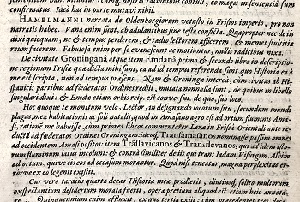
“Hamelmann’s stories about the old Oldenburg rule over the Frisians I will consider untold. After all these are nothing but hot air, fabricated stories with no source by a bunch of sycophants. I also said nothing about this to avoid wasting my time and the reader’s time who would certainly become incredibly bored and would accuse me of foolishness. After all, made up stories ultimately disappear and die, because they have no roots.”
Afterwards Gisecken and Hamelmann junior are sent to the gallows: (ill. 20) “If new people come along and try to bite me or scare me by making a fuss, it is my intention to ignore them as much as possible. I will do the same thing I did a long time ago, when a shameless person from Oldenburg (I do not feel like mentioning his name)—a sad little man who wanted fame had decided to attempt to turn a famous and noble count against me—by publishing an incredibly slanderous book full of allegations, light on facts, written by someone else (I repeat someone else, because what would an ignorant little lawyer do without a wordsmith?), completed with the tasteless bark of rhymers, which he aimed at me, while making a disgraceful spectacle of himself.”
Illustrations 13 - 20
Then in the preface to this edition from 1616, he also included his review of Hamelmann precisely as he had published it in the first edition of the third decade from 1599. In this later edition he subtly added the qualification ‘sincere judgement’ in the margin next to this review.
The University of Groningen Library has in its possession a copy of the 1616 edition of Rerum Frisicarum historia that Ubbo personally (autocheiri) donated to our university. The title page bears the word anathema (gift). On the cover sheet, a comment still shows his sharp pen: “This copy has been thoroughly and carefully cleared by the author of the countless misprints the previous edition held, and this same author now dedicates this copy to this Academy library. Ubbo Emmius himself.”
In 1616 the University of Groningen was two years old. Ubbo Emmius had been closely involved with the founding of the university. He had also served as its very first rector magnificus. The university played no part in Emmius’ fight with Oldenburg. All the more reason to celebrate our strong relationship of the present day.
Ad fontes
- Catalogus van boeken en handschriften, nagelaten door den heer Mr. R.K. Driessen, in leven Archivarius der Provincie Groningen ... Welke openlijk zullen worden verkocht, den 1sten Mei 1832 en volgende dagen, op het Reventer binnen Groningen (Groningen 1832), p. 26
- J.J. Boer, Ubbo Emmius en Oost-Friesland (Groningen 1936), pp. 61-63
- Ubbo Emmius. Tentoonstelling ter gelegenheid van het 40-jarig bestaan van het Groninger Historisch Dispuut ‘Ubbo Emmius’, ed. E.H. Waterbolk et al. (Groningen 1976), pp. 21-22
- Ubbo Emmius. Ausstellung im Rathaus am Delft, Emden, 11. Dezember 1977 bis 8. Januar 1978, ed. E.H. Waterbolk et al. (Emden 1977)
- A. Eckhardt & H. Schmidt, Geschichte des Landes Oldenburg (Oldenburg 1987)
- A.J. Rinzema, “Ubbo Emmius als historicus” in Ubbo Emmius. Een Oostfries geleerde in Groningen/Ubbo Emmius. Ein Ostfriesischer Gelehrter in Groningen, ed. W.J. Kuppers (Groningen/Emden 1994), pp. 49-62
- E.H. Waterbolk, “Van grafrede naar biografie” in: Ubbo Emmius: Willem Lodewijk, graaf van Nassau (1560-1620), transl. P. Schoonbeeg (Hilversum 1994), pp. 9-27
- G.A. Dekker, Ubbo Emmius. Leben, Umwelt, Nachlass und Gegenwart (Norderstedt 2010)
- K. van Berkel, Universiteit van het Noorden: vier eeuwen academisch leven in Groningen. Deel I: De oude universiteit, 1614-1876 (Hilversum 2014), pp. 125-126
| Last modified: | 17 November 2023 12.35 p.m. |


